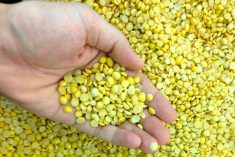CNS Canada –– Based on how its high pulse prices and stockpiling regulations have held the market’s undivided attention in recent weeks, India’s place in the driver’s seat of the pulse trade appears safe.
While new data from the World Health Organization on the carcinogenicity of processed and red meat is driving attention to alternative protein sources, analysts expect little change in the Canadian pea and lentil market.
Within those markets, pulse shortages and high local prices in India are still the most pressing issues.
Read Also

IGC February report adjusts world data
There were several revisions made to the International Grains Council monthly supply and demand report issued on Feb. 19, most notably in soybeans.
India’s government has recently imposed restrictions on how many tonnes companies can hold, going so far as to raid and arrest those suspected of hoarding.
“Major importers who are bringing in vessel loads of peas and lentils into India from Canada, as well as other pulses from other countries, have some grave concerns about this rule,” said Gordon Bacon, CEO of Pulse Canada.
Major importers are concerned about how to move products and keep costs reasonable, he said.
On Monday the World Health Organization (WHO)’s cancer research agency said processed meat is carcinogenic, while red meat is probably carcinogenic.
U.S. annual per capita red meat consumption has already dropped 15 per cent to 101 pounds in the past 10 years, according to the U.S. Department of Agriculture.
“I think it just enhances everything that people are already doing,” said David Newman of Victoria-area pulse trading and processing firm Commodious Trading.
As it stands, lentils and peas — though they have been touted as plant-based proteins — do not have a large market in North America, and new data is unlikely to change that, he said.
Even a slight uptick in demand, if it were to happen, wouldn’t do much for global markets, he said.
“The demand forces in those markets are culturally non-meat places anyways,” Newman said. “I just could never see loading up a 100-car train and driving it to Los Angeles.”
— Jade Markus writes for Commodity News Service Canada, a Winnipeg company specializing in grain and commodity market reporting.















